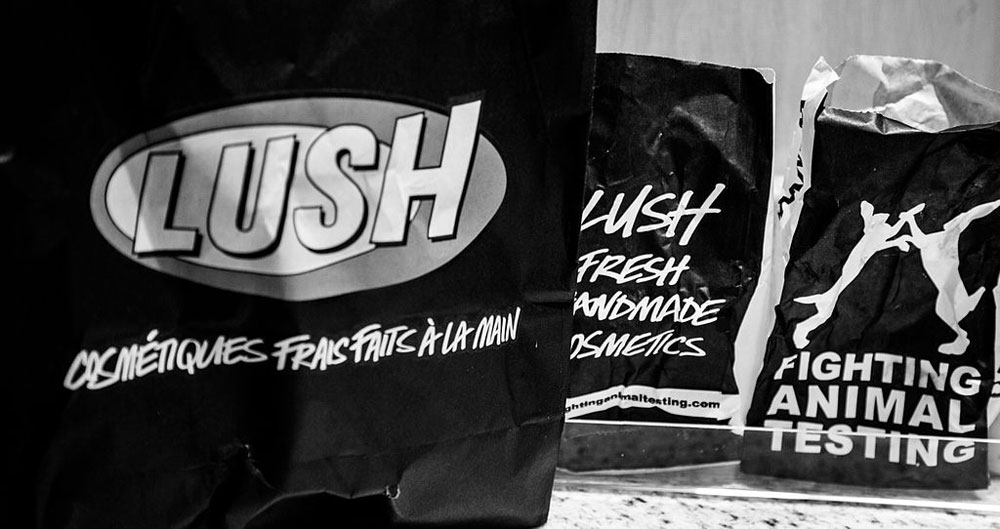
March 4, 2020; Colorlines
In October, NPQ wondered, “What is corporate activism?” The question then pertained to Dick’s Sporting Goods, which destroyed $5 million worth of assault rifles in a stand against gun violence. This week we look at Lush cosmetics, which has joined with several Latinx grassroots organizations to take a stand against inhumane immigration enforcement.
Mijente, United We Dream, and Community Change have partnered with Lush in the “Freedom of Movement” campaign, which hopes to “promote equality, unity, dignity, security and liberty for all those who migrate to North America.”
In concrete terms, the partnership means a few things. First, every store across the US is declared a sanctuary space, where Immigration & Customs Enforcement (ICE) is not welcome and no undocumented person will be reported. Mijente members will be at tables in stores to engage the community in campaigns, such as resisting a CPD gang database in Chicago or demanding that tech giants refuse partnerships with ICE. Lush is also selling a soap, “Mi Casa Es Tu Casa,” from which they hope to raise $350,000 for United We Dream, Mijente, and other similar groups.
Priscilla González, Mijente’s campaigns director, said, “We have worked with Lush to ensure we have the right message and call to action but more importantly, ensuring Lush had direct input from the local grassroots organizations doing the work—and that those organizations would directly benefit from the proceeds.”
Lush has a history of social engagement that’s core to its company model; they were founded to produce products that are free of synthetic ingredients or plastic packaging and are never tested on animals. They have a strategy of partnering with nonprofit and advocacy groups to promote human and environmental rights. Past efforts include working with the National Center for Transgender Equality to fight discrimination and marine health nonprofits to support shark conservation.
This year, they chose to focus on the Trump administration’s crackdown on undocumented immigrants and the surge of sanctuary spaces that have risen to protect them. NPQ has written about sanctuary cities, but churches, schools, and hospitals have also declared themselves safe spaces.
Sign up for our free newsletters
Subscribe to NPQ's newsletters to have our top stories delivered directly to your inbox.
By signing up, you agree to our privacy policy and terms of use, and to receive messages from NPQ and our partners.
In a rather unpleasant coincidence, the week that Lush, Mijente, and others announced their partnership, ICE announced it would be stepping up raids and surveillance in sanctuary cities, deploying hundreds of officers un unmarked cars in cities whose local officials have refused to cooperate.
The New York Times reported that ICE would be deploying tactical BORTAC (Border Tactical Patrol) agents in the effort, which means aggressive surveillance by teams that usually respond to “emergent and high-risk incidents.” BORTAC training bears similarities to US Special Operations Forces. The Times also quoted nonprofits saying that ICE agents had been posing as police officers and using other ruses to apprehend those who were informed and protected enough to avoid the first waves of arrests.
A statement by Mijente on Lush’s website reads, “Migrants are facing an all-out assault on multiple fronts. What we’ve borne witness to is nothing short of a full-scale war…not even an end to the unabashedly anti-immigrant Trump administration would be enough to undo the harms that its policies have caused to thousands of migrants, refugees and asylum seekers.”
Elizabeth Allen, a professor at the University of California, Irvine, explains that sanctuary in the US originated in the 1980s as a way to protect Central American refugees who were fleeing US-instigated conflicts. As a medieval practice, sanctuary allowed for “fearsome mercy,” time for felons to negotiate a reduced sentence with secular monarchies. It served the same purpose during the Reagan administration, giving time for public opinion to turn on the covert wars in Central America. Lawmakers then created Temporary Protected Status for the refugees who had initially been classed as economic migrants.
Representative Jesus Garcia of the 116th Congress has introduced the New Way Forward Act, support of which is part of Mijente’s goal in partnering with Lush. Among other things, the bill ends mandatory detention and forbids the Department of Homeland Security from partnering with for-profit entities to keep anyone in DHS custody.
Realistically, the act is unlikely to pass, which is what makes partnerships like Freedom of Movement so critical. Until federal protection can be created and enforced, it is up to communities to protect their most vulnerable members—and it’s not a task that can be accomplished by any group alone.—Erin Rubin













